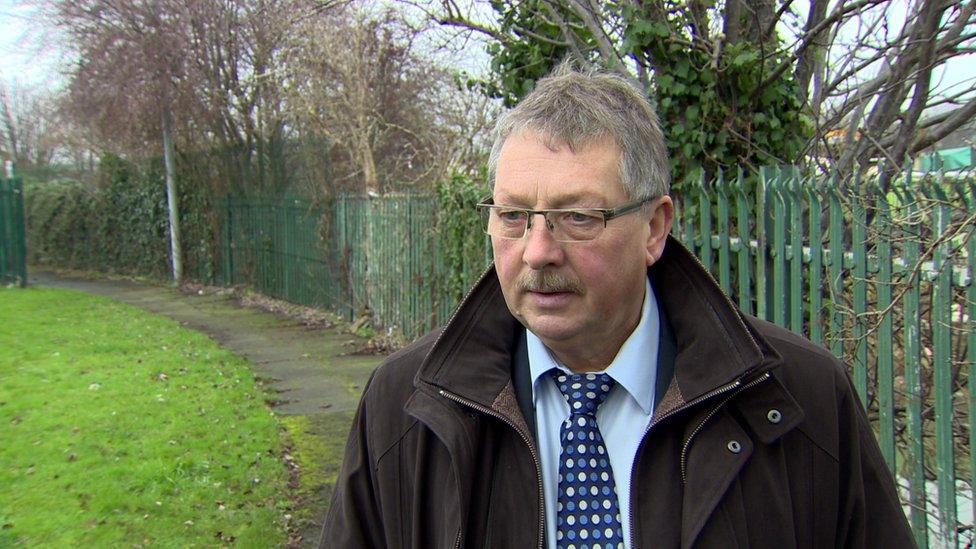RHI scandal: Michelle O'Neill defends her role promoting scheme
- Published

Michelle O'Neill held the post of agriculture minister from May 2011 to May 2016
Sinn Féin's Michelle O'Neill has defended her role in promoting the Renewable Heat Incentive (RHI) scheme when she was the agriculture minister.
She was responding to critics after it emerged the Department of Agriculture hosted 58 workshops explaining RHI's benefits while she was in charge.
The SDLP and Alliance have asked her to clarify exactly when she became aware there were financial problems with RHI.
But she said Sinn Féin "shut it down straight away" when the issues arose.
The RHI scheme was set up in 2012, intended to increase the creation of heat from renewable sources.
However, businesses have been receiving more in subsidies than they are paying for renewable fuel and the scheme became highly oversubscribed.
'Get in quick'
The fallout from the scandal surrounding the scheme, which is approximately £490m over budget, resulted in the resignation of Sinn Fein's deputy first minister, Martin McGuinness, the collapse of Stormont's institutions and the calling of snap elections on 2 March.
Mrs O'Neill, who was appointed Sinn Féin's northern leader last week, held the post of agriculture minister from May 2011 to May 2016.
Alliance and the SDLP said some of the 58 seminars organised by her then Department of Agriculture and Rural Development (DARD) coincided with a "spike" in RHI applications in October 2015.
SDLP leader Colum Eastwood said: "Essentially these seminars were telling farmers to 'get in quick'.
He added: "Sinn Féin must answer what they knew, when they knew and what they did about it?"
Former Alliance leader David Ford, who is now the party's agriculture spokesperson, said Mrs O'Neill "has serious questions to answer".
"While on the surface it may well be as simple as a government minister promoting a scheme from another department, the critical issue is what Michelle O'Neill knew and when, if her department was alerted to the flaws, and whether she knew about those flaws when the economy minister closed the scheme, claiming it was a victim of its own success."
'Very generous'
Sammy Wilson of the Democratic Unionist Party (DUP) said that when Mrs O'Neill was promoting RHI, she was acting on the same information available at the time to his party leader, Arlene Foster.

Sammy Wilson said Michelle O'Neill's RHI involvement "should be subject to the same degree of scrutiny" as that of his party leader, Arlene Foster
"She has just as many questions to answer as she claimed Arlene Foster had," Mr Wilson said.
"First of all her department (DARD) promoted the scheme. It promoted the scheme right up to the last minute, even when it was known that the rates of pay were very generous. She knew what the rates of pay were because her own department's leaflet said that at the meetings people would be told about the rates of return."
'Clear evidence'
Ulster Unionist Doug Beattie said Mrs O'Neill should not take on the first or deputy first minister roles in any new executive "until the [RHI] inquiry has reported - because there's quite clear evidence that she knew what was going on".
"It's not about her stepping aside now, there's nothing for her to step aside from," he added.
'Right thing'
Speaking to BBC News NI ahead of a meeting with Prime Minister Theresa May and Taoiseach (Irish Prime Minister) Enda Kenny, Mrs O'Neill said the DUP's comments were an attempt to "sidestep" the scandal.
"There was a scandal which was created by the DUP," she said.
"This is all about deflection, the fact is the DUP were the architects of the scheme and they failed to correct the problems with the scheme."
Asked if she was the one who had acted irresponsibly, Mrs O'Neill said: "Absolutely not."
She also said she did not regret holding seminars promoting RHI because "promoting the scheme to farmers" was "the right thing to do at the time".
"I'm perfectly content with my position," she added.
DARD was replaced by the Department of Agriculture, Environment and Rural Affairs (DAERA) last year.
A DAERA spokesman said DARD's Renewable Energy Action Plan 2010 included Practical On-Farm Renewable Energy (POFRE) events at Greenmount and Enniskillen Campus.
"The events were advertised and they provided practical advice and information about a number of various renewable energy options for farmers and the rural sector," he said.
"Technologies discussed at these regular events included wind power, biomass production, heat from biomass, solar photovoltaic, micro-hydro and energy storage."
- Published7 November 2017
